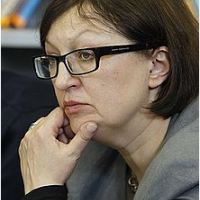WEBCAST: Russian Independent Media During the Coronavirus Pandemic
Since the coronavirus pandemic emerged in Russia, the information industry has been under increased pressure by the Kremlin. The regime has attempted to make the work of journalists as difficult as possible and wield control over every publication, both public and private, to take control of the information surrounding the outbreak. In this panel, Grigory Yudin, Roman Badanin, Tikhon Dzyadko, and Galina Timchenko considered how the role of the media changes when society is seized by anxiety, fear, and a lack of transparency. They also addressed how independent media is faring as their connection to their audiences and advertisers alike are collapsing.
SUMMARY
In a panel chaired by Kennan Institute Senior Advisor and Journalist Sergey Parkhomenko, speakers Roman Badanin (Founder and Editor-in-Chief, The Project), Tikhon Dzyadko (Editor-in-Chief, TV Rain), Galina Timchenko (CEO, Meduza), and Grigory Yudin (Professor of Political Philosophy, Moscow School of Social and Economic Sciences) discussed the role and performance of Russian independent media during the coronavirus pandemic.
Tikhon Dzyadko began by discussing Dozhd’ TV’s changing relationship to its audience and subscribers during the pandemic. He explained that although advertising revenue has fallen, the volume of his audience and subscribers has grown due to the public’s eagerness for accurate coverage of the crisis. The outlook is not necessarily positive, however, as Dzyadko foresees a drop in income and viewership as subscribers lose income and audiences tire of the pandemic’s repetitive coverage.
Galina Timchenko continued the conversation on audience trends by discussing the widespread decrease in interest in topics unrelated to the pandemic. However, Timchenko’s publication, Meduza, has seen a growth in interest in explanatory journalism, regional news, and human-interest pieces.
Roman Badanin expanded upon the topic of audiences’ shifting focus by discussing investigative journalism during the pandemic. He provided examples of the Project’s work in which pieces unrelated to the crisis gained widespread attention while others on the coronavirus flew under the radar, undermining the assumption that audiences are only engaging with news related to the pandemic. Badanin emphasized the significance of investigative journalism, particularly during a crisis, and audiences’ continued interest in investigative work.
Grigory Yudin then shifted the conversation to discuss the current independent media landscape through a theoretical lens, citing Walter Lippmann’s and John Dewey’s respective top-down and bottom-up models of media and public engagement. Yudin asserted that the top-down model exemplified by the Russian state media has failed miserably, while Russia’s independent media, demonstrating the value of the bottom-up model, has risen to the occasion. Independent media or the “bottom-up media” have instead assumed responsibility for purveying accurate and consistent information. Yudin explained that this, coupled with a gradual fall in state-run media’s viewership as it competes with social media, demonstrates a crisis for state-run media and the cause for optimism among independent media.
Turning to questions, the speakers addressed Russia’s anomalously small death toll, the effects of coronavirus on regional reporting, and their difficulties finding forthcoming government officials or sources during the pandemic, agreeing that a majority of sources would only come forward anonymously for fear of reprisal.
Selected Quotes
Roman Badanin
"Conclusion number one: of course the coronavirus is the topic of great demand right now… Number two: at the same time, the coronavirus outbreak doesn’t necessarily mean that people are not interested in topics of great social importance… conclusion number three: mentioning coronavirus is not a guarantee of its potential higher reach.”
“The coronavirus outbreak worsens all the troubles that Russia has had before… did the coronavirus worsen the situation with freedom of speech in Russia? Yes, definitely. Did the coronavirus affect….relations with different authorities? Yes, it did… That is why the coronavirus situation is the most productive time for journalists because we have a lot of things to do, we have a lot of things to dig in.”
Tikhon Dzyadko
“We here at Dozhd’ see two trends: the first is that the amount of our audience is growing because people are eager to get information about coronavirus. The second trend is that we are getting more subscribers because people don’t believe the official information, they don’t believe the official media, and they are ready to pay for independent journalism.”
“The fact that our government still doesn’t want to talk normally with independent media is a big problem but there is nothing we can do about it.”
Galina Timchenko
“They are trying to stop us from informing our audience about the real situation; we are trying to do our best… this cat and mouse play continues day by day.”
“This epidemic shows [members of the independent media] that we can finally forget about our quarrels… and to combine our efforts to spread the real information.”
Grigory Yudin
“The top-down model has failed notoriously [during this pandemic] because the state-controlled media seem to be perfectly set to give explanation and justifications for the actions of the Russian government so that citizens could understand the rationale behind certain epidemiological measures… and yet suddenly when there is a true request for consistent explanation of the government’s policy, they failed completely to deliver a consistent narrative.”
“This pandemic shows that there is a deepening crisis in the top-down model in Russia...now [the state-run media] suddenly fails to do the only thing it was supposed to do: communicate a clear message from the government to Russians. To me, it’s probably an indication that the alternative model, the bottom model, is flourishing.”
Speakers




Moderator

Journalist, publisher, organizer of civic projects
Hosted By

Kennan Institute
After more than 50 years as a vital part of the Wilson Center legacy, the Kennan Institute has become an independent think tank. You can find the current website for the Kennan Institute at kennaninstitute.org. Please look for future announcements about partnership activities between the Wilson Center and the Kennan Institute at Wilson Center Press Room. The Wilson Center is proud of its historic connection to the Kennan Institute and looks forward to supporting its activities as an independent center of knowledge. The Kennan Institute is committed to improving American understanding of Russia, Ukraine, Central Asia, the South Caucasus, and the surrounding region through research and exchange. Read more
